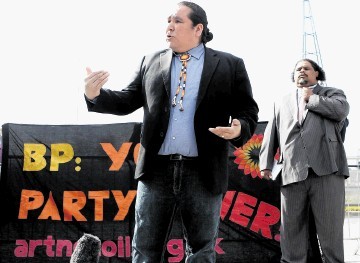
BP’s senior bosses contended with screaming environmental protesters, a backlash on executive pay and more anger over the company’s record in the Gulf of Mexico at an eventful annual meeting yesterday.
Some activists were carried from the ExCel centre in London after staging a bizarre demonstration against BP’s attitude towards climate change.
The oil giant’s board was asked by an undercover protester if it had a spaceship to allow its members to escape environmental catastrophe before the man and several colleagues played dead on the floor and refused to move. No arrests were made.
Meanwhile, a shareholder said BP gave the impression the board had its snout in the trough by awarding chief executive Bob Dudley an annual bonus of $850,000 (about £540,000).
The criticism was backed by a large number of investors as 11% of shareholder votes were against the company’s remuneration report.
Before the meeting started, Derrick Evans, from Gulfport, in Mississippi, said BP’s clean-up operation in the wake of the Gulf of Mexico Macondo disaster had been a complete fiasco.
“The oil is not gone,” he said outside the meeting. “The general perception is that BP made a mess and BP did a big cleanup and everything is all fine. “Nothing could be further from the truth.”
BP has so far paid about £4.7billion in cleanup costs and compensation, with more than 200,000 individuals and businesses claiming compensation from the £13.8billion fund set aside for victims of the Deepwater Horizon rig disaster. Mr Dudley told shareholders that BP’s guiding principle on the cleanup was not to do the minimum as required by law, but to do the right thing. He added: “We have continued to devote people and resources to the area and we are seeing recovery. The beaches are open and 2011 was a great year for tourism. Independent studies have shown that gulf seafood is safe to eat.”
Defending the company’s pay packages, chairman Carl-Henric Svanberg said BP “works to understand the mood and the society in which we are based”.
BP also faced a protest from environmentalists opposed to the development of Canada’s tar sands by BP as a major oil source. Clayton Thomas-Muller, who is the tarsand campaign director for the Indigenous Environmental Network in Canada, urged shareholders to call for a withdrawal from the area in Alberta, Canada.
After protesting outside in front of banners reading “BP out of the tar sands” and “BP your party’s over”, Mr Thomas-Muller addressed the board.
He asked what contingency plans the company had if it lost a legal challenge against its development.
Mr Dudley said he believed the development of oil sands was good for Canada and explained that BP used a less-invasive procedure requiring steam to harness the oil from the sands in Alberta.
BP reported annual replacement-cost profits of about £15.1billion in 2011, compared with a loss of £3.1billion the previous year.
BP saw its shares rise sharply last month after a £4.9billion deal with 110,000 businesses and individuals over the Deepwater Horizon disaster.
The out-of-court settlement worth £5billion was less than expected but it still faces a challenge from the America’s department of justice.